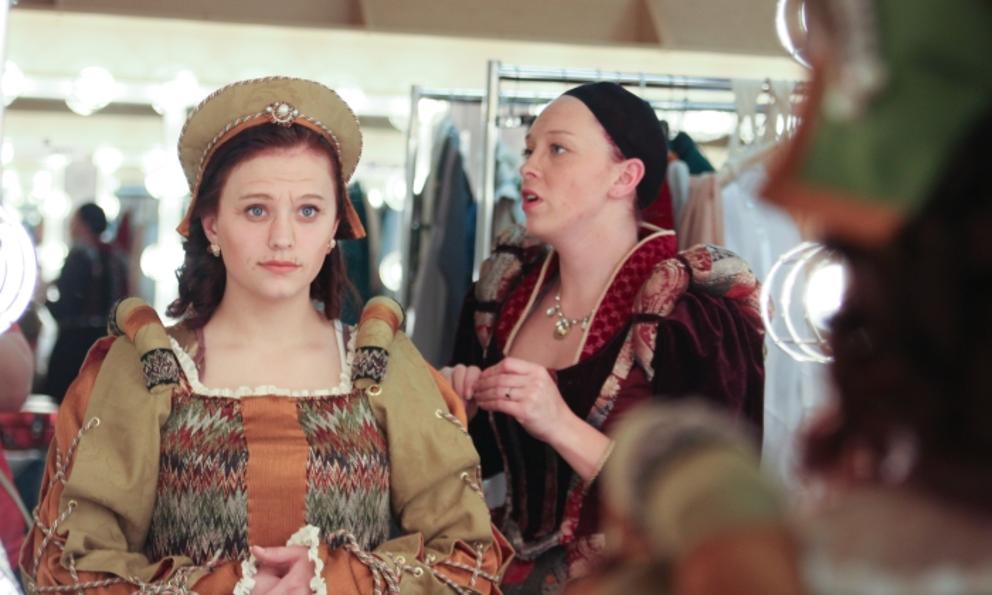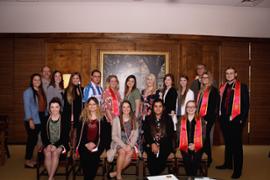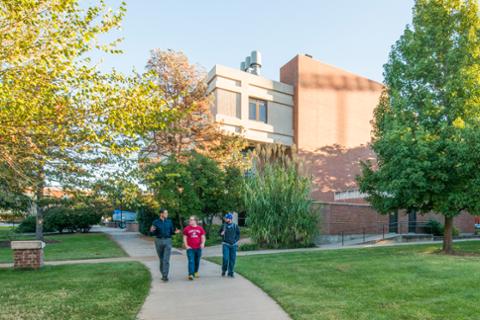Communication
The Department of Communication offers Bachelor of Science and Master of Arts degrees within a collaborative and collegial environment. Our top-ranked faculty are highly active in their professions and emphasize the importance of fusing theory with applied skill. We have more than 250 majors across the six emphasis areas of communication education, human communication, media production, multimedia journalism, strategic communication, and theatre. The department stresses an integrated and active approach to learning. Please explore our website and let us know if you have any questions.
- Mission and Vision
- Undergraduate Program
- Undergraduate Emphases
- Graduate Studies
- Internships and Scholarships
- Alumni Testimonials
Mission
The Department of Communication at Pittsburg State University provides an integrated program of preparation for careers in strategic communication, multimedia journalism, media production, human communication, theatre, and communication education. The activities and programs uniquely available from the department reflect a multicultural and interdisciplinary perspective commensurate with the goals of a liberal education for students. The same unique activities and programs provide services for the University, the community and the region. The department is committed to promoting the ideals of freedom of expression, and at the same time developing an understanding in our students of the significance of responsible communication in society. The department fully endorses an active approach to learning.
Vision
It is the vision of the Department of Communication to provide a high quality, individualized education that prepares our students for a professional life in Communication and its cognate disciplines. We envision our students developing the ability to understand and critically analyze their worlds to provide a base for life-long learning. Our vision includes support for ongoing contributions to our discipline and to the citizens of the region from our faculty and students. We seek managed growth consistent with the support provided by the University.
The structure of the communication major allows students to select a specialized emphasis area but also allows enough electives to create a broad career path. The structure reflects career opportunities that increasingly call for flexibility, adaptability, and a wide range of communication skills. Undergraduate courses range from 100 level through 700 level courses.
The Core Requirements (18 credit hours)
The core for all majors includes courses that provide a theoretical and historical summary of the communication field while enhancing written and oral communication skills. There is also a strong emphasis on career development and understanding the integrated nature of the various communication disciplines. Advanced courses such as COMM 629 Theories of Human Communication are required of all students. In addition, all students are required to take a senior capstone course, COMM 699 Communication Careers, in which they prepare a portfolio that is assessed by a faculty committee. The core requirements help students prepare for entry-level positions while developing a comprehensive understanding of the role communication plays in our society.
Professional Career Emphases (15 credit hours)
This section provides a four-course block in one of seven career tracks - Human Communication, Media Production, Strategic Communication, Multimedia Journalism, Theatre, or Communication Education.
Free Elective (12 credit hours)
Students are urged to consult with their advisors to select additional courses that would strengthen their career preparation.
Undergraduate Emphases
Human Communication
Students in the human communication emphasis often work in management, leadership roles, politics, or continue on for advanced studies in the field. This emphasis examines the comprehensive role of human communication in everyday life. Students will learn to understand and analyze communication in a variety of contexts, including interpersonal relationships, workplace teams, and community and cultural groups.
Media Production
Media production prepares an individual for a career in the field of producing, editing, and directing both live and recorded audio and video content for multi-channel distribution. Students will learn the art of planning, script writing, sound engineering, camera usage, and electronic media distribution techniques. Practical experience is offered through our student-produced cable television station, CAPS 13 and KRPS, our 100,000 watt FM public radio station.
Contact: Dr. Troy Comeau
Multimedia Journalism
Multimedia journalism prepares students for careers in the news industry. Students take classes in news reporting, broadcast journalism, photojournalism, online journalism, and media law, and get practical experience through on-campus media outlets. Students in this area learn to collect information through interviewing sources, interpreting and organizing information, and presenting it to the public. MMJ students also learn about the rights and responsibilities of journalists in a free and open society. They find careers in digital media, radio, television, cable, print, and online news, as well as PR and other media-related fields.
Contact: Dr. Ken Ward
Strategic Communication
Strategic communication involves the applied research, creative development, and planned distribution of informational and persuasive communication messages across a wide variety of channels including: television, radio, print and digital journalism, mobile and social media platforms. Strategic communicators often work on behalf of public and private corporations and non-profit organizations, regionally and globally. Specialized career opportunities are available in many sectors such as: sports and entertainment, travel and tourism, health and wellness, policy and public affairs.
Contact: Dr. Alicia Mason
Theatre
Theatre prepares the individual for work in the arts and entertainment industry across a broad spectrum of areas such as performance, technical production, design, and/or management. Individuals graduating in this emphasis area also work in many tangential industries such as hotel/restaurant management, event planning, and facilities management. At PSU, the theatre program, stresses a liberal arts approach that trains each student across the entire discipline in state-of-the-art production facilities. Participation, collaboration, and service are integral components of the program.
Contact: Dr. Megan Westhoff
Communication Education
This degree opens the door for a rewarding career in teaching and directing speech/theatre programs at the secondary school level (grades 6-12). It leads to licensure in the state of Kansas and graduates may apply for a license in other states as well. Graduates of this program are qualified to teach speech communication, mass media, theatre, debate, and forensics.
Contact: Gil Cooper
Graduate Studies
The Master of Arts Degree with a Major in Communication is designed to prepare graduate students for professional and academic careers. It also encourages thoughtful and continuing study in subjects of the student's interest. Working with an advisor, a master's degree student in communication can design a program to match an individual's career choice. Qualified candidates may be eligible for assistantships, which provide a tuition waiver and a graduate teaching stipend.
Learn about Graduate Degrees and Programs
Career Opportunities
Students who earn a Master of Arts Degree with a Major in Communication will gain skills in problem-solving, analysis, research methods, and scholarly writing. Graduates find employment as:
- University Professors
- Community College or High School Instructors
- College and High School Administrators
- Journalists
- Public Relations Consultants
- Television Production Directors
- Business Managers
Internships
Experiential learning is at the heart of a communication degree, and there are many ways in which students can gain practical experience in their fields. In fact, communication majors are required to demonstrate applied knowledge in their senior portfolio. Though practical experience can be gained through class projects, independent studies, and student organizations, one of the best ways to gain practical experience is through an internship. Internships provide experience and insight into a student's chosen area. They can be a means of developing contacts and the beginning of a professional network.
In the Department of Communication, the COMM 399 Communication Career Development class is designed to help students learn the skills, such as resume development and letter writing, necessary to find and apply for internships. Students are also introduced to the resources in the Office of Career Services. Internship opportunities are listed on department bulletin boards and are posted on the department’s Facebook page. Academic advisors can also be helpful in directing a student toward an internship opportunity. Up to 3.0 hours of academic credit can be earned for an internship by enrolling in COMM 690. Visit the link below to find out more about enrolling for internship credit.
Scholarships
Every year, the Department of Communication awards over $30,000 in scholarships to communication majors. The majority of department scholarships are earned scholarships, meaning they are awarded based upon academic performance and/or participation while at Pittsburg State University per criteria designated by the scholarship donor. There are some scholarships directed toward incoming freshmen. Scholarships are awarded in every emphasis area and also for overall achievement in the department.
It is important to note that scholarships cannot be awarded unless the student has applied for financial assistance. Application for Financial Assistance must be completed and submitted online through the PSU Financial Assistance website, not the department. We encourage all students to complete and submit an online application for PSU Financial Assistance. All applications for financial assistance must be submitted by FEBRUARY 1 for the following academic year.
Inquiries only about departmental scholarships can be directed to the Department of Communication at 620-235-4716 or at the office, 215 Grubbs Hall.
Alumni Testimonials
-
"This isn’t a field to go into where you are training for one job the rest of your life. You are training your brain and leadership styles to be successful in a variety of environments, so be open to opportunities, job shadow, ask questions, and ask your professors for advice. Get involved in theatre, clubs, internships, service—whatever it takes to build your resume and stand out. It’s usually those extra experiences that are going to make you stand out among other job candidates. Definitely don’t be afraid to learn new skills and take advantage of every professional opportunity to publish, research, or observe. Those experiences are resume builders. Finally, ask yourself who you want to become, not what you want to become. The Comm major prepares you as a person for success. The job title will fall into place." (Kristy M., MA, 2012)
-
"Never underestimate the value of your degree and knowledge! When people say “What can you do with a Communication degree?” you should always respond with “What CAN’T I do with a Communication degree?” The skills and knowledge you have obtained in your tenure at PSU are applicable across all fields of business, art, government...they are invaluable!" (Stephanie S., BSed, 2004 MA, 2006)
Get Involved
- CAPS 13
- Pitt State Theatre
- Media Production
- Campus Publications
CAPS 13, Cable Access Pitt State, is the Department of Communication's student-produced cable television station. Our students learn to use studio and portable video equipment, editing consoles, and a complete radio laboratory with two audio boards, including a state-of-the-art digital audio production facility.
Through CAPS 13, our students produce a live, 30-minute weekly news broadcast, "CAPS 13 News,” in addition to many other feature shows.

Pitt State Theatre is dedicated to educating and inspiring theatre makers.

Students get hands-on experience with broadcasting equipment in the first-year at Pitt State and produce more than 100 live productions annually, Student-led broadcasts are viewed by more than 100,00 individuals each year. See past productions on pittstate.tv!
- The Collegio
Pittsburg's student voice since 1916
- Lambda Pi Eta
- Alpha Psi Omega
- PR/Ad Club
- Student Association of Broadcasters
- Student Association of Photographers
The Nu Eta chapter of Lambda Pi Eta, is the Department of Communication Honor Society. Founded at Pittsburg State University in 2001, under the advisement of Dr. John Couper, Nu Eta continues to flourish. The organization promotes community service, public awareness, and a sense of camaraderie among communication majors.
The requirements for membership in Nu Eta are as follows: communication major, junior or senior in standing, and a 3.0 GPA.

Pittsburg State University is the Alpha Epsilon Theta Chapter of Alpha Psi Omega National Theatre Honor Society.
In 1921, at Fairmont State College in Fairmont, West Virginia, college theater took root. A faculty director was hired in 1923, and the Masquers were formed. The Masquers were charged with presenting a season of four to five major productions per year for students and the general public. In 1924, the Masquers began searching for a national honorary organization to join. As there was no truly national organization, Elinor B. Watson, Robert Sloan, and Paul F. Opp, Fairmont faculty director, researched forming such a national organization. The faculty advisor of Alpha Psi Omega is Dr. Megan Westhoff.
The Pittsburg State University Public Relations/Advertising Club is a student organization based out of the Department of Communication. The PR/AD Club helps students enrolled in PSU receive experience in the public relations and advertising field. The faculty advisor of PR/AD is Dr. Alicia Mason.

The Student Association of Broadcasters (SAB) is PSU's student association affiliated with the Kansas Association of Broadcasters. The faculty advisor for SAB is Dr. Troy Comeau.
Student Association of Photographers is an organization for students interested in photography at Pittsburg State University. Established in the Department of Communication, SAPS is intended to provide an opportunity for its members to share their work with other photographers. The faculty advisor for Student Association of Photographers is Dr. Kristen Livingston.
- Becoming a Gorilla
- Current Gorillas
Contact Information
Chair: Dr. Troy Comeau
Contact: Becca Linder
Department of Communication
215 Grubbs Hall
Pittsburg State University
1701 S Broadway St
Pittsburg, KS 66762
Phone 620-235-4716
Fax 620-235-4686


